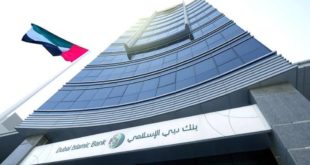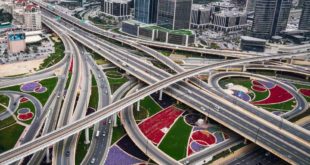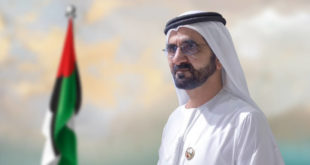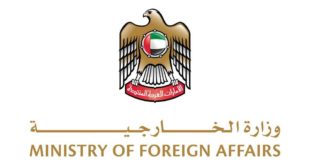Abu Dhabi on August 3 /
The number of electric cars has increased in the UAE amid expectations of a continued growth in their number as part of a plan that aims to account for half of the number of vehicles registered in the country by 2030, as part of the strategy of shifting towards a sustainable and environmentally friendly transport sector.
In the year 2023, the UAE continued its efforts to prepare everything necessary to accelerate the transition towards environmentally friendly vehicles. This year witnessed the issuance of legislation and policies regulating the sector, the opening of factories for electric cars and others to recycle batteries, and ending with the launch of projects to expand the network of charging stations in various cities of the country, to be added There are factors related to the official support for such a trend, and the competitiveness of the UAE market, which removed the obstacles faced by the spread of electric and environmentally friendly cars in many countries of the world.
Formation and laws.
The UAE government supports the shift towards electric or hybrid cars to reach a green or environmentally friendly transport system in line with its strategy for climate neutrality, which contributes to achieving the state’s goal of reducing energy consumption in the transport sector by 40 percent, and reducing carbon emissions by 10 million tons by 2050. .
In response, the UAE has taken many proactive steps over the past years to be one of the countries in the world most prepared to make a smooth transition in this sector. Last July, the Ministry of Energy and Infrastructure announced the details of the national electric vehicle policy, which constitutes a regulatory framework aimed at standardizing the infrastructure standards for electric vehicle charging stations. And provide unified foundations that ensure coordination and integration between the authorities concerned with electric vehicles at the level of the UAE, so that the policy is added to a legal and legislative package developed by the UAE to regulate the work of this promising sector.
The policy also aims to build a unified database for electric car charging stations in the UAE through the national chargers platform, and also work to raise the quality of roads and maintain the first place in this indicator globally.
Shipping network.
At the beginning of this year, ADNOC Distribution signed an agreement with the Abu Dhabi National Energy Company (TAQA), with the aim of launching a new project called (E2GO), to establish and operate the necessary infrastructure for charging electric vehicles in the Emirates, especially in the Emirate of Abu Dhabi.
The Emirati energy company asserts that there is a need to establish about 70,000 electric charging stations in Abu Dhabi by 2030, to meet the growing demand for this type of car.
Specialist examination.
And last June, the General Command of Abu Dhabi Police, in cooperation with ADNOC Distribution Company, opened two new lanes for checking electric cars in the UAE, with the aim of giving priority to owners of electric cars in checking their vehicles.
Dubai fare.
Last February, the Dubai Roads and Transport Authority announced a plan to convert taxis in the emirate (Dubai Taxi and franchise companies), by 100 percent, into environmentally friendly (hybrid, electric and hydrogen) vehicles by 2027.
She said: The five-year plan (2023-2027) aims to convert all taxi sector vehicles within five years, as 10 percent of vehicles will be converted annually, for a period of five years, to reach 100 percent in 2027, indicating that this plan It is in line with the authority’s approved roadmap for zero-emission mass transportation by 2050, and the emirate has already achieved a conversion rate towards environmentally friendly vehicles in this sector by 50 percent.
– 360 buses for events.
In a related context, the Roads and Transport Authority in Dubai signed a strategic partnership agreement with the Al-Futtaim Motors Group. Under the agreement, the latter will provide 360 buses and electric and hybrid vehicles for use in major conferences and events hosted by Dubai, while providing technology and technologies related to electric charging for a period of 3 years.
– 750 vehicles in Sharjah.
For its part, the Emirate of Sharjah continues its efforts to expand its sustainable sectors by providing fully electric vehicles and buses to meet the needs of passengers as part of a positive and effective contribution to sustainability. In early August, it announced the arrival of its fleet of electric and hybrid cars to more than 750.
– recycling .
In keeping with this, the Bee’ah Recycling Company, the Ministry of Energy and Infrastructure and the American University of Sharjah signed an agreement to study the establishment of the first plant for recycling expired electric car batteries, which includes work to add a facility for recycling electric car batteries in the company’s Bee’ah waste management complex.
This agreement came at a time when a study conducted last year – according to what was reported by the Emirates News Agency – indicated that 30 percent of individuals in the UAE expressed their willingness to switch to electric cars.
– Auto industry .
On the other hand, the Department of Economic Development – Abu Dhabi and the NWTN company, which is listed on the Nasdaq Stock Exchange and specializes in providing environmentally friendly transportation solutions, signed an agreement aimed at training and providing job opportunities for Emirati talents and developing the environmentally friendly automobile industry and the green economy.
According to the agreement, the two parties will accelerate the development of the automotive industry and environmentally friendly means of transportation in the Emirate of Abu Dhabi, encourage the innovation community to contribute positively to automotive technology, enhance appropriate frameworks for the green economy, and explore opportunities for cooperation in advanced technology, innovation, research and development in the transportation industries, which are among the sectors targeted by the strategy. Abu Dhabi Industrial Development.
It is noteworthy that last year, the UAE witnessed the inauguration of the “Mglory Holding” group, the Al-Damani factory for the manufacture of electric cars in Dubai, which is the first industrial facility of its kind in the UAE.
As witnessed in 2022, yearn
 Media ININ Economy We Trust
Media ININ Economy We Trust








